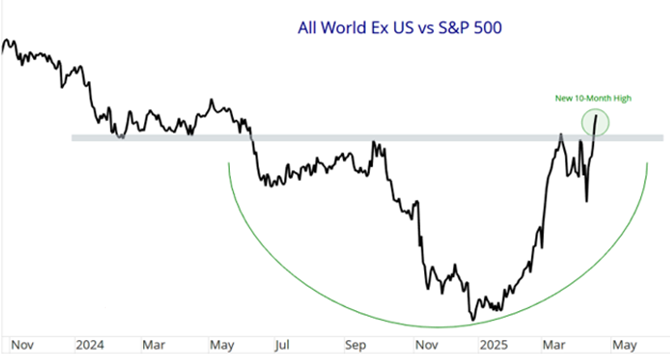US shares no longer number one!

Geert Van Herck
Chief Strategist KEYPRIVATE
April 30, 2025
(updated May 06, 2025)
2 minutes to read
Following the election of Donald Trump as US president, investor sentiment seemed euphoric.People couldn't seem to get enough of US shares. Shares from other regions were thrown out and even European investors were heard saying: “Just invest in an S&P 500 tracker and don't look back!”
As a result, a lot of money flowed into trackers of leading US stock market indices. “American exceptionalism” was the buzzword of the day. Stock market analysts and economists mentioned the structurally higher growth of the US economy compared to that of other economic regions.
When people in the US talked about Europe's potential growth, the tone was often rather condescending. Excessive regulation in Europe and a lack of innovation were arguments for not investing in European shares. The technological leadership of the US with companies such as Apple, Amazon and Nvidia also played a part.
However, now that a few months have passed, Trump's trade policy has wreaked havoc on the international stock markets. Most stock market indices have lost a significant percentage since "Liberation Day" – 2 April, the day President Trump announced his higher trade tariffs.
Consequently, the contrast with the previous pro-American sentiment couldn't be greater. The proof is in Graph 1, which shows the relative performance of non-US shares versus US shares.
The upward trend indicates a better performance of non-US shares compared to US shares. At the start of 2025, there is clearly a trend reversal. The rising curve simply means that European and Asian shares (the main non-US markets) are far outperforming US shares.

Source: All Star Charts
What can we learn from this?
Once again, this proves that diversified investing is the best way to spread risk and limit losses. Putting all your eggs in one investment basket is simply asking for trouble. Investors who spread their equity portfolios across US, European and emerging market shares in recent months will now have lost far less than investors who only played the US card.
Investors who still have significant exposure to US equities could, for example, use the recent recovery to build up positions in European and emerging market shares.
Stock markets often present scenarios that no one could have foreseen. That’s why diversification pays off.


